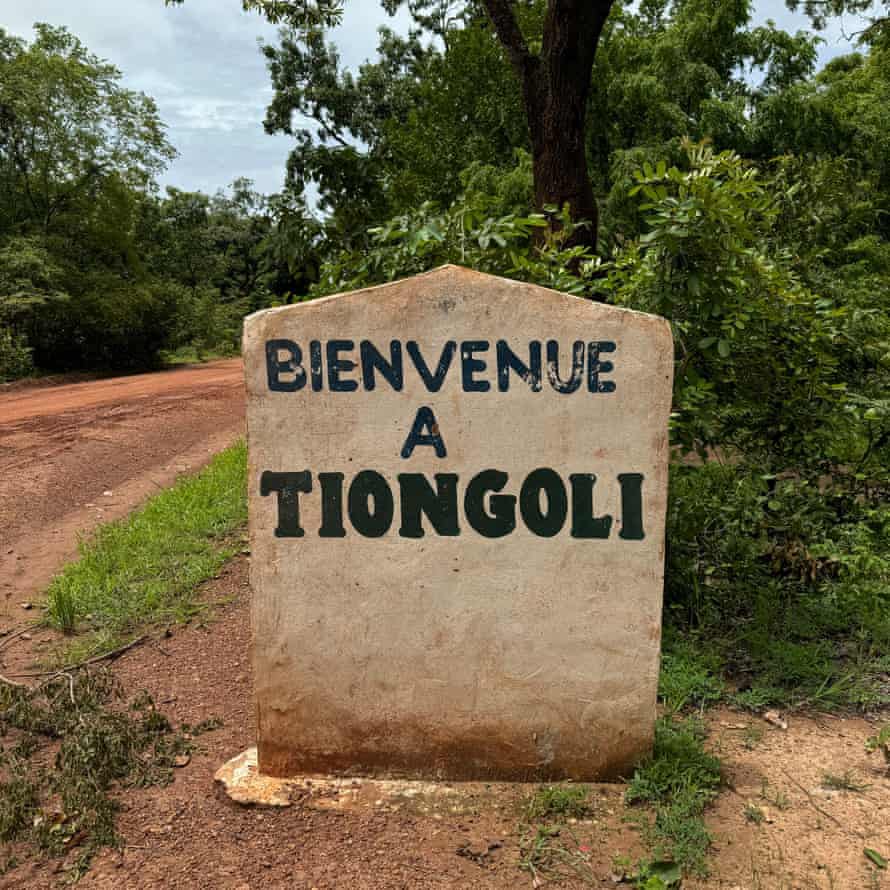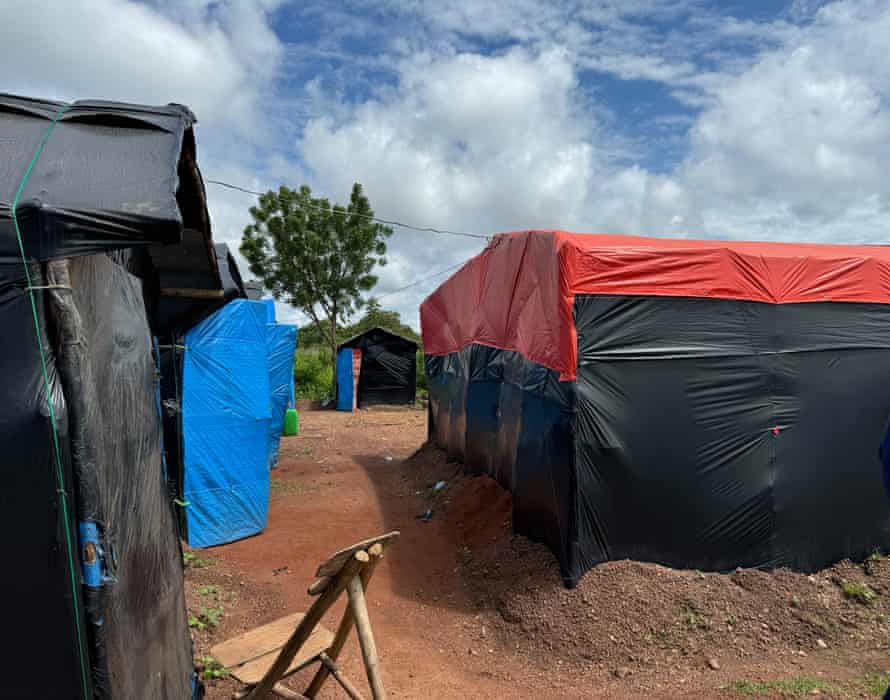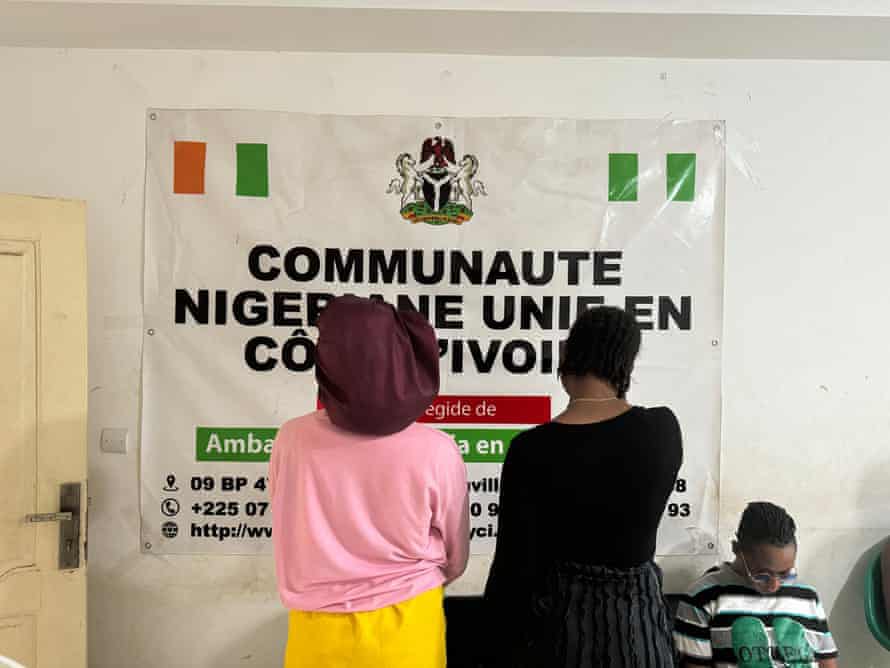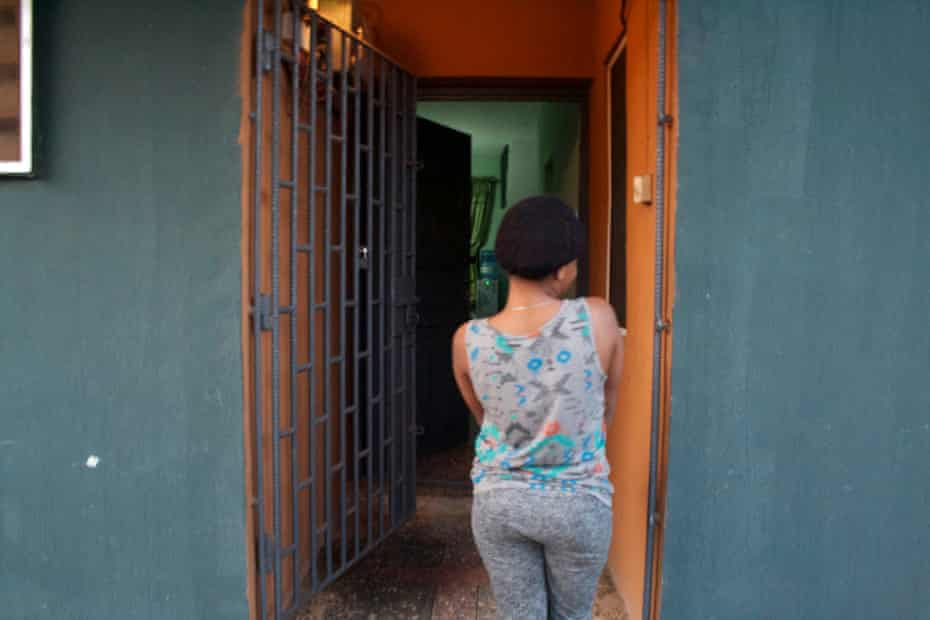The first French phrases Nigerian teenager Sara* learned when she arrived in the city of Bouaké were “Alors baiser” and “c’est douce”, to initiate sexual activity and then to fake pleasure during the act.
The daughter of her mother’s best friend had told her she was going to the Ivorian city to sell body lotion. Instead, an older woman – a “madam” – who had paid for her travel without her knowledge sent her to brothels in the city every night.
Sara says she is paid between 3,000–5,000 Central African Francs (CFA) – between £3.90 and £6.50 – for every man she sleeps with for a “short-time” and 25,000 CFA for an overnight stay. The money is split three ways between the brothel, Sara and the madam.
Three months after arriving in Bouaké, Sara is still waiting to earn enough to pay off debts of 2.5m CFA to the madam for travel, clothes, sustenance and bribes paid to agents, and return to Nigeria.
“She [the madam] took my Nigerian sim card when I came here, so I couldn’t call my people at home for the first month,” says Sara, who now goes by the name of Sugar and refuses to give her real age.
Trafficking is a major crisis in Nigeria, with between 750,000 and 1 million people forced into begging, prostitution, domestic servitude, armed conflict and labour exploitation.
According to Nigerian officials, Sara is one of thousands of Nigerian female sex workers scattered across towns and cities in Ivory Coast.
The girls and women are mostly trafficked by agents who are taking advantage of record unemployment in Nigeria and operate under the guise of offering better paid work. Ten years ago, the Nigerian naira was triple the value of the CFA; today N1 equals 0.38 CFA.
Due to its stable economy and prostitution being legal, although soliciting sex is not, Ivory Coast has become an attractive destination for sex work. Some victims go on to become madams who source other girls, to recoup money they spent and to regain their own freedom.
Across Nigeria, recruiting agents go into rural communities or post in job seekers’ groups on Facebook, talking ambiguously about hustles that yield plenty of rewards and sending photographs of girls and women they have recruited to known madams.
They coach recruits to tell immigration officials, who are sometimes aware of what is happening or simply don’t care enough to carry out proper scrutiny, that they are crossing the border to go to the nearby market in Cotonou, an auxiliary port for Nigeria.
Many recruits say agents, who have been known to be a relative, do not accompany them on the journey but pass their numbers to other agents who guide them across the porous borders. With no means of identification, they gain access by paying bribes of 1,000-2,000 CFA, sometimes paid ahead to the driver by the agents.

Bienvenue a Tiongoli is one of the small settlements in the forest where trafficked women are kept in makeshift brothels. Photograph: Eromo Egbejule
Unlike Sara, most of the sex workers trafficked from Nigeria live deep in the Ivorian jungle, far from the eyes of the law.
In Tengréla, 7km (4.3 miles) from the Malian border, there are several artisanal miner’s camps used by men from Mali, Burkina Faso and Guinea to earn money before returning to their countries. Nigerian sex workers aged from about 14 to 38 also stay here in small settlements of makeshift tents made of black nylon held together with sticks.
At the maquis – as the small bars are known in Francophone Africa – owned by madams in the settlements, both sets of immigrants fraternise, first publicly and then privately.
“There is an odd belief in some of the gold mining regions that sex helps you find gold, which in turn [fuels] demand for sex trafficking,” says one former Nigerian official who was previously stationed in Ivory Coast. “The cocoa [production] communities also have high sex demands to keep the men satisfied.”
In an interview with at least two dozen girls and women in the forest, some as young as 15. Some of them said they had been starved for refusing to work or beaten up by angry patrons. Many barely speak French and say they don’t know the country well enough to be able to escape.
Nigerian officials who have managed to repatriate girls trapped as sex workers say they have seen girls as young as 13 in the interior.
“A lot of the girls we found claim to be over 18 and doing sex work of their own free will, but most of the time from their physical appearance, you know they are not,” says the former Nigerian official. “Tests to determine their age, such as scanning a wisdom tooth, cost about 50,000 CFA so you have to talk to them, but if they are insistent, you let them go back.”

Makeshift tents made out of black nylon stretched over poles in a rural setting
Many trafficked girls and women work in brothels in the forest near the Malian border, used by migrant workers in mining camps.
Ivory Coast has a law criminalising trafficking, but it is barely enforced, and the country has been criticised by the US state department for its failure to tackle the problem.
The escadron, a notorious Ivorian police unit, has burned down some of the settlements where traffickers operate, but new ones keep springing up, partly because security personnel who come into the jungle allegedly demand weekly bribes of 1,000-2,000 CFA for each trafficked girl.

Girls who have escaped at the office of a Nigerian community group in Treichville, Abidjan, Ivory Coast. Photograph: Eromo Egbejule
The spokesperson for the National Agency for the Prohibition of Trafficking in Persons (Naptip) in Nigeria, Adekoye Vincent declined to comment when questioned about girls trapped as sex workers in Ivory Coast. The Ivorian national police and gendarmerie did not respond to requests for comment.
For Sara, the wait to return home goes on. She was in junior secondary school in Port Harcourt, in Nigeria, before dropping out to travel to Ivory Coast. These days she is learning how to barter condoms for other items.
“I really don’t like the work I’m doing here. I miss my people at home,” she says.
Source: The guardian
